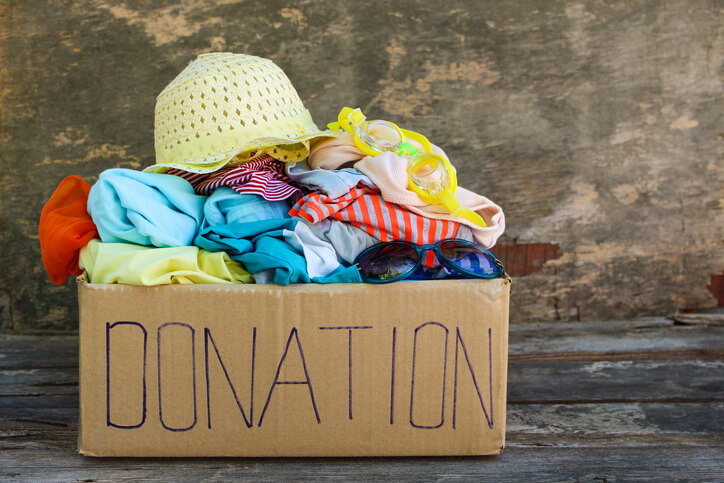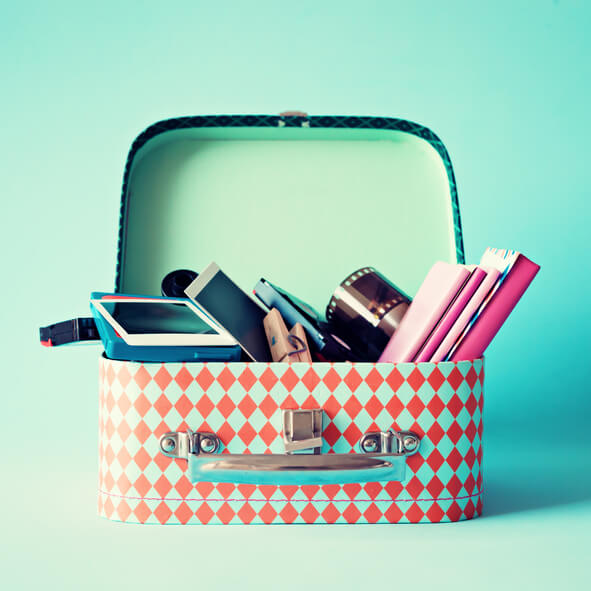The idea of downsizing can feel overwhelming—sorting through years of belongings and deciding what stays and what goes is no small task. But it’s also an opportunity: a chance to reassess what truly matters and lighten your load for the next chapter. For many people, the choices are the tricky part, particularly if the possessions create nostalgia or hold sentimental value. These could be gifts, inherited items or things associated with people, places and memories from your past.
Depending on the amount of space in your new home, you likely won’t need to let go of all the sentimental belongings. You probably enjoy having some—or many—of them in your home. The challenges can arise when you’re considering possessions you don’t need or even necessarily like. However, you may feel obligated to keep these items or guilty and conflicted about giving them away. But if you’re committed to downsizing your belongings, there are lots of ways to make it easier. Here are some methods for dealing with those items you just can’t seem to let go.
Know Yourself
When you start to downsize and declutter, you may get stuck on objects you don’t use and would happily get rid of but for the fear you might regret it. Possibly. Someday. While it may seem difficult to get past this, challenge yourself to think about which specific things you have regretted parting with in the past. Chances are there aren’t many. Those you can recall likely fall into a pattern. By understanding and respecting this pattern, you can determine what you’ll regret giving up and how to prevent it.
For example, maybe you wish you’d kept all your college textbooks or every novel you’ve ever bought, not because you want to re-read them, but because you don’t like forgetting what you’ve read in the past. Going forward, you can feel free to give away old books after writing down all their titles or keeping track of your read books on an app like Goodreads.
Moving forward, applying clear rules or guidelines that you create regarding how and why you’ll choose what to keep and what to discard. Perhaps you keep one souvenir from each place you’ve visited and donate clothes that no longer fit.

Tell a Different Story
Sometimes, it may be easier to part with nostalgic or long-held possessions by mentally re-framing and re-writing the story you tell yourself about them. If you spent a lot of money on a special dress, and feel you should have worn it more, tell yourself you paid for the wonderful experience of wearing it—even if it was just once. If you’re holding on to items that represent a former lifestyle, job, clothing size, or hobby, think about how useful those items were in the past, how lucky you were to have been able to have them then, and how now that that era of your life is over, you and the items are naturally moving on. And if you donate them, someone else will have the benefit of enjoying them and creating their own stories.
Save Selectively
Even when you can’t—or don’t wish to—save everything, you can usually save something. Choose one item to represent a set such as one particularly unique stuffed animal out of a massive collection. This often makes it easier to properly display and appreciate it and to recall the memories it holds. When saving just one object out of many won’t work, you might be able to save a select part of an item. Say you have fond memories of wearing an old coat, but now it’s tattered, out of style and you haven’t reached for it in years. Rather than storing the coat indefinitely or throwing it away and feeling sad, you could instead salvage its pretty buttons and use them to replace the plain buttons on a newer piece of clothing. The result could strike a balance between preserving nostalgia and successfully achieving your downsizing goals.
Another option that lets you retain the sentiment of items without taking up any space is to scan them (if they’re documents) or photograph them (if they’re bulkier items). This enables you to look at them and reminisce without having to find room for them in your home.
Let Go of Gift Guilt
Gifts can be some of the most difficult items to let go, and the reason may be two-fold. It could be they have meaning because of who gifted them to you, but it could also be due to a fear that you may offend the giver. This feeling can be internal, as in the sense that you’re not a good friend because you don’t like the gifted item as much as you should. It can also be about real or anticipated external consequences—what if the giver asks about the item or comes over and notices that it’s not there? In many cases, this can be less about the gift itself, and more about the relationship you have with the person who gave it to you.
If you want to minimize gifts given to you in the past, remind yourself that after properly thanking the giver at the time, you’ve done your part. Few givers really expect you to keep a gift forever. They want you to enjoy the item, not to stress out every time you see it hanging on the wall. Still, there may be instances when someone may be offended or have unusual expectations. For your own peace of mind, it can help to have an answer ready in case they do note the gift’s absence. “Oh yes, I remember that painting well. I enjoyed it for many years, then when I moved I didn’t have room for it. Fortunately I donated it so someone else could enjoy it, too. It really is so kind how you always remember my birthday.”
In the future, you can let loved ones know what kind of gifts you prefer. Try expressing your newfound appreciation for lovely things that just happen to be ephemeral or consumable, like experiences, flowers or wine.

Focus on Giving
If you feel that it’s wasteful to throw things away, or difficult to let them go, ease your feelings by concentrating instead on what you can give to someone else. When you downsize the possessions of your home, you will probably find many things you can donate to charity or give away to friends. When you focus on how much someone else can use or enjoy your things—especially someone who couldn’t afford or find the item otherwise—you replace the sadness of “abandoning” a nostalgic object with the good feelings of helping a stranger or surprising a loved one with an unexpected gift.
Plan Your Downsized Future
As you go through these exercises, you may feel like it’s all about endings: the end of an era, perhaps, or of a particular item’s lifespan. It’s also an opportunity to think about how you plan to live with less belongings or less attachment to material things in the future. As you sort your things into piles to throw away, donate, or keep, imagine how you’ll go forward. Maybe you’ll decide to replace souvenirs with photographs as memories of your travels. Perhaps you’ll choose to shop for fewer clothes, or to only purchase one item if you donate another. Could you experiment with a new decorating style that celebrates clean lines and open areas? When you see downsizing as less about what you’re giving up and more as the beginning of an exciting new way of living, you may start to feel much better about relegating things to the “no” pile.
While the overall process can be hard work, the goal is to improve your life. Living in a home with objects you truly no longer like or use can be an energy drain and a mental distraction. So perhaps looking at the exercise as a positive and energizing effort will help as you make decisions about the items you own and what you truly may be able to let go.








I have a wall picture that belonged to my deceased sister. It’s a memory that I will keep forever.
What a wonderful article on how to declutter! It touched on everything one would have to go through both physically and emotionally. It made me feel much better about the whole process!
So true. Those dumb gifts I just can’t seem to get rid of or all the business books/seminars I spent so much on but didn’t make any profit from but I just CAN’T seem to let it go. I think one day they will finally make me millions, but likely not. I like your pattern concept. I’m going to have to think about that one a lot. I tell my mother whenever I come home I wish they’d just give it all away because you are right you don’t feel so affected when it’s finally gone. I do have a hard time letting go things MAKE for me it’s more personal and when that gets thrown out by the exchange students that’s when I’m pissed. Cheers
Have always had a problem with being able to get rid of gifts from a three foot diameter clock to a fancifully decorated egg to pictures of the grands from schoolhood days long past. This helped me and several things will go to the local animal shelter resale store.
The one thing (really things) that I cannot part with are all the photo albums that I have put together during the past 65 years. When I sold our family home and moved into a condo after my husband died, I actually had two floor-to-ceiling bookcases built to hold them. Since digital cameras, there are fewer photos to put in albums. Instead, I have a zip-lock bag that holds over 16 years of photos and videos on cards that I have not been able to look at because technology changes so fast, that I no longer have (or know) the equipment to view them on. I tell my family when I become too old to take care of myself, just put me in a home and give me a different album each day or week or month and I will be content. Then they can do whatever they want with them after I am gone. Till then, I want them nearby me.
Thanks for the item about decluttering. After over 66 marriage, I have a lot of antiques from my great grandparents & both sets of grandparents. Some things my kids want,
but I don’t know what to do with the other items. Still have lots of stuff & any suggestions would be appreciated. Thanks. Also have an Old book on the Life & Times of General Ulysses
S..Grant, Published i 1800’s
I bet you do. My parents are hitting their 50th and they take saving things on a whole new level coming from the Depression era. (the real one not 2008).
Take pictures of the book & pages that really stand out to you and scan them on a disk and either sell it for a lot of money to a historian or history buff. Maybe put it on eBay where people will bid on it and make more money. Or you could donate it to the museum of natural history.
Hi, What a timely article, It seems serveral of your topic covered me just starting to get serious about home/decluttering. In same married 62 yrs this August and in the same house 55+yrs, my kids are out of town. I will let you know how it goes.
Although it took time, I found new homes for all of my needlework projects, patterns, books, tools and supplies. By visiting local crafts fairs, I got the names of people who engaged in the same hobbies. I contacted them and offered to donate these items, which were so much appreciated. Senior housing communities also welcomed some of them, as well as jigsaw puzzles. This method made me feel better than to donate them to various charities.
My local library welcomed unwanted books.
How about these:
60 years of diaries!
Same with photo albums. Plus, Dad was a photographer…zillions of those.
I’m a writer. Cannot toss books or magazines with my articles.
OR newspapers with my columns (from when I worked for a newspaper.)
But I really appreciate this article because it caused me to think. I do NOT need all the material saved for a book never finished…begun 30 years ago.
And if I clear out my filing cabinet I’ll have space for what’s stacked in boxes on the floor.
(And I do NOT need 20 years of Reader’s Digests.)
Maybe I can put some of the above stuff in a few emptied file cabinet drawers…You see, I am a paper hoarder. Wondering whether there is hope for me.
Take pictures of your articles and magazines. Anything you’ve written that was published and scan it onto your computer laptop or a disk or thumb drive. Maybe you can do the same with your fathers photography. It sounds like you could start your own museum and charge people to come in. You just have to find a great name that embodies your father‘s photography and your published articles.
It sounds like you have some wonderful memories there. What I’m doing is gifting things to family. I have a little tiny Red corduroy jacket that both my children wore and all three of my daughter‘s children wore. So now I am embroidering my daughters name and birthdate on it and putting it in a frame and gifting it to her. At the rate I’m going I will never have to buy another gift because I’m going to personalize it and frame it and give it away.😊
The suggestions in the declutter article may help me give away the business attire that I don’t wear since I retired and that I keep thinking I might still need. Not.
Good luck with your suits! I threw mine out for permanent construction clothes!
Great article! In the beginning of the decluttering phase. The kids will have first crack at the items then grandchildren then great grandchildren. Then off to donations. Thanks again for the article.
I would never get rid of the Teddy Bear my nanny gave me as a child. She loved and nurtured me like a good mother would. If she hadn’t cared for me the first six years of my life, I would not be the person I am today.
The other item I will never part with is a worn and tattered Heidi picture book. It was given to me by my father one time when he visited and I was sick. Heidi is one of my favorite stories.
This was an incredibly insightful article. I am in the very beginning of my decluttering process and this touched many areas in which I am struggling. I have saved it and will review as I continue down the path of clearing my life and home of things that no longer add value.
I lived in Europe for a long time and I have many souvenirs that I bought from all the countries I visited as well as a lot of souvenirs from both Germany (lived here 6 years) and Belgium (2 years). I will not give these items up as they not only represent my mother (Belgian) but also the happiest time of my life. Taking pictures of these things and the furniture I bought there does not cut it.